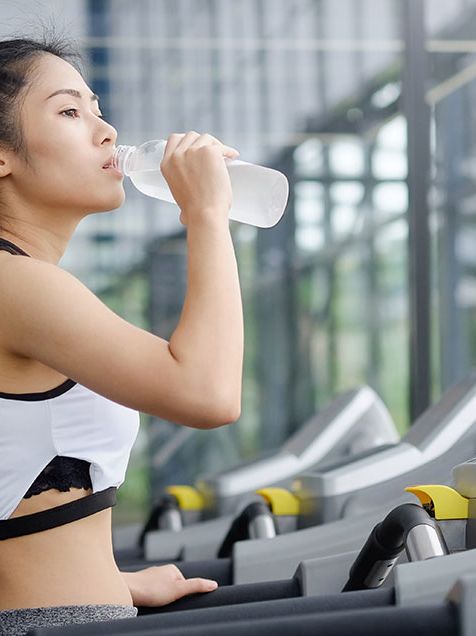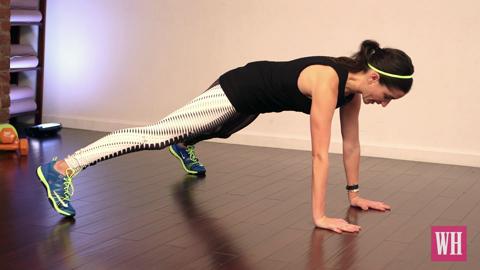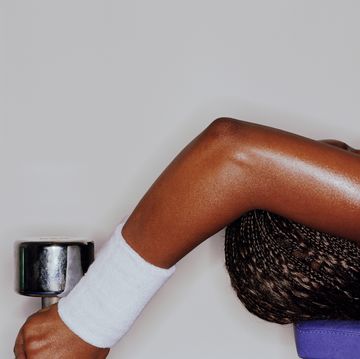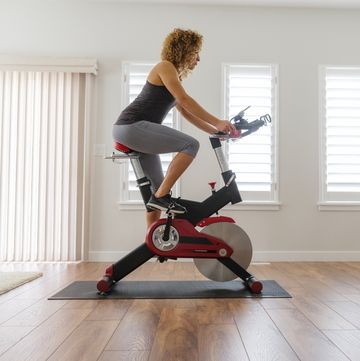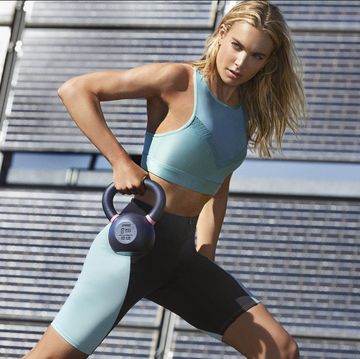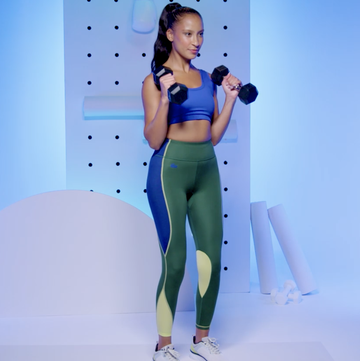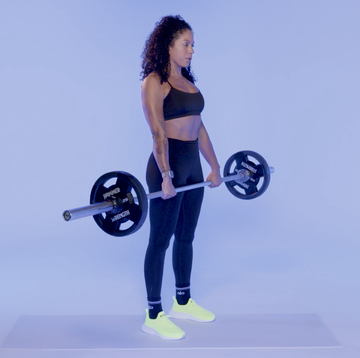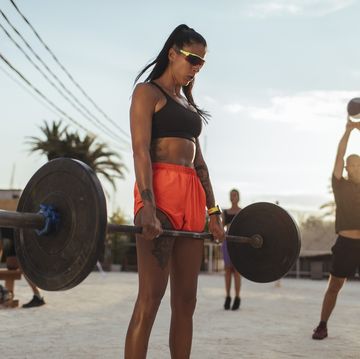It’s all over social media: fitfluencers sipping their “BCAAs” before or after a workout in order to beat fatigue, improve muscle recovery, and prevent pesky soreness. But is it a supplement you need? Will it really make a big enough difference in your workout to bother? Or, can you get the same nutrients from food? We’re here to break it all down.
First, let’s chat about what BCAAs are. It stands for “branched chain amino acids,” which include three essential amino acids: leucine, isoleucine, and valine. Amino acids make up proteins. Basically, when you eat that chicken breast, your body breaks it down into amino acids, where it forms proteins that get to work in your body doing various tasks, like building and repairing muscle after that crazy spin class you just took.
Related: 4 Workout Trends You Should Skip, According To Experts
You know how important protein is for reaching your goals, and an active body needs more than the average person. In a new position statement from the International Society of Sports Nutrition, exercisers should eat 1.4 to 2 grams of protein per kilogram of body weight per day. That means a 130-pound person would need about 82 to 118 grams of protein per day.
Depending on your diet, that goal may or may not be tough to reach. Especially since the ISSN suggests eating an even amount of protein every three to four hours during the day. That means skimping on protein at breakfast and lunch and then stuffing it in at dinner isn’t going to do you any favors. And if you’re aiming to tone up and slim down, BCAAs can be extra helpful, explains NASM certified personal trainer Ashley Wiseman. “When you’re trying to lose weight, you must cut your calories to burn more than you take in. When you do this, you break down fat and muscle at the same time,” she says. Your goal is to preserve muscle mass while burning fat, and that’s what BCAAs can help you do. “I like to think of BCAAs as ‘saran wrap’ we put around our muscles to protect them,” she says. (Learn how bone broth can help you lose weight with Women's Health's Bone Broth Diet.)
Though you can eat all this in the form of lean proteins, veggies, legumes, dairy, and whole grains (yes, they all have some protein), taking a supplement may help streamline the process.
So you know protein is important, the question is: Can you get that from a BCAA drink? Many of these supplements come as a powdered drink mix that contain BCAAs as well as high doses of B vitamins and perhaps other ingredients designed to burn fat, like EGCG. You add a scoop to water and then drink before, during, or post-workout.
The benefit of these is that they get into your bloodstream quickly where they can quickly get into muscles and spur growth. But as the ISSN points out, science isn’t totally sure how good of a job they really do.
Related: 7 Simple Exercises That Show Results After One Workout
What the research says on BCAAs
Consider this 2016 study that asked exercisers to take a BCAA-carbohydrate supplement, carbohydrate only, or drink water. After an especially tough bout of strength training, their blood was drawn and they were evaluated for muscle soreness. After three days of this regimen, researchers concluded that the BCAA-carb group had the same amount of muscle damage and soreness as the carb-only group.
Not all studies are so down on BCAAs. In the Journal of Exercise Nutrition & Biochemistry, researchers did conclude that taking BCAAs compared to a placebo pre-endurance exercise can blunt muscle damage. Another found it may help you be able to handle back-to-back toughie sessions better.
Mix up your workout routine with these 5 different pushup variations:
One limitation? These studies are all done in men (as are many exercise studies because women have pesky periods that alters their hormones throughout the month…), so things could conceivably be different for women, but we just don’t know. Dealing with conflicting research is tough. While you don’t have to run out and buy a huge container, BCAAs may help you. The reason why Wiseman takes them stemmed from experimenting on herself. “I found that when I was consistently taking BCAAs, I had better performance in my workouts and less soreness. That in itself is worth it to me,” she says.
If you do decide to drink BCAAs, these supplements may also contain artificial flavors, artificial sugars, and artificial coloring, as well, so read the ingredients list and determine what you’re comfortable with.
Related: This Is How Much Strength Training You Should Actually Do Every Week
For her clients who like to work out before eating, Wiseman advises they take BCAAs pre-exercise. In theory, this allows your body to use amino acids in the supplement rather than breaking down your muscles to get them, she says. Otherwise, take them during or post-workout. “This is when they can help with muscle recovery and muscle preservation,” she notes from experience.
That said, getting your BCAAs from food is number one. Some excellent sources include lean meat, dairy, fish, and eggs. Speaking of, milk is a particularly great supplier of muscle-repairing protein. Sipping it after exercise has been shown to lessen soreness. Eggs are also a great source of that most important amino acid, leucine. Plus, they’re both inexpensive.
Bottom line: From what we know, these supplements aren’t harmful, and they could even be helpful if you have trouble getting in all the protein that you need (due to a restricted diet or taste prefs). But if they’re too much of a drag on your wallet, you definitely don't need them an awesome workout. Just make sure your healthy eating habits are on point, and the rest will follow.

